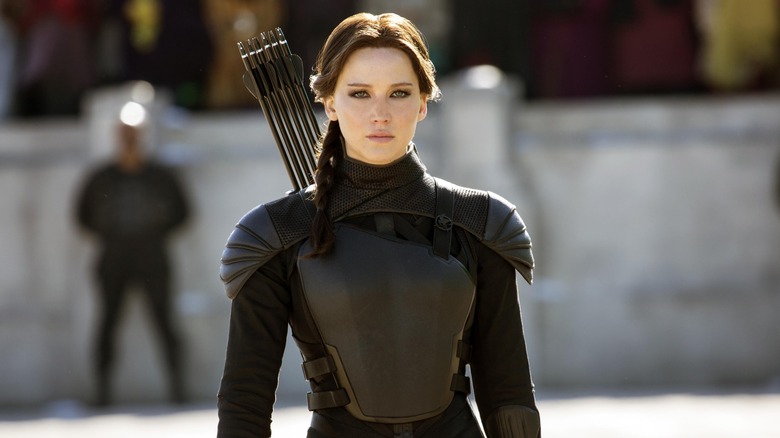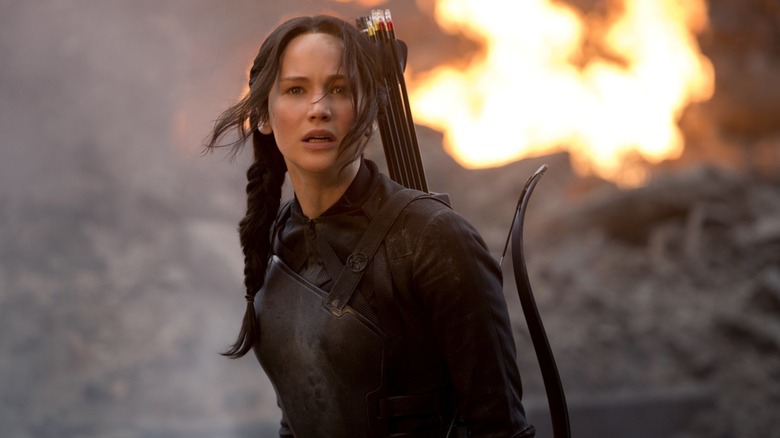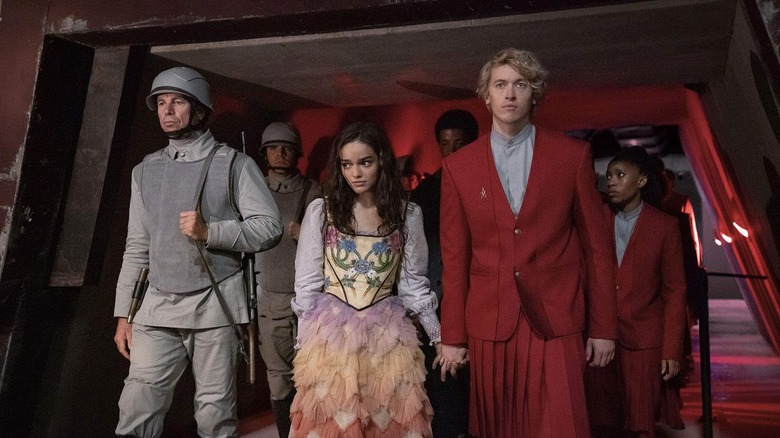The Hunger Games Director Regrets One Of Mockingjay's Biggest Decisions
Of all the film series to come out of the young adult fad, "The Hunger Games" is the best. "The Maze Runner" might have better action and set pieces, but "The Hunger Games" is narratively richer. It's also an excellent beginner's guide to how rebellions are formed in the real world, which has kept the franchise feeling uncomfortably topical in the years since it last graced the big screen. There's a reason why a "Hunger Games" revival in 2023 makes loads more sense than rebooting "Twilight" or redoing any of the myriad of failed sci-fi YA novel adaptations that followed in its wake.
There was, however, one unfortunate YA trend that "The Hunger Games" fell victim to, and that was dividing its finale into two parts. Even then, the series fared better than others. Splitting "The Hunger Games: Mockingjay" in two allowed "Part 1" to dig deeper into the revolution against the Capitol and how its architects use Katniss Everdeen (Jennifer Lawrence) to rally the masses to their cause. This also freed up "Part 2" to spend more time exploring the aftermath of the subsequent war and the problems that emerged in the immediate wake of President Snow's (Donald Sutherland) downfall.
Mind you, at the time of their respective theatrical releases in 2014 and 2015, the "Mockingjay" films received a fair deal of criticism for taking this approach. In an interview with People, Francis Lawrence (who directed "Catching Fire" and both "Mockingjay" films) admitted that he regrets ever making that decision and wouldn't do it again if he had the chance.
Two movies for the price of two
After the "Divergent" series came to an unceremonious end when the first half of its would-be two-part finale, "Allegiant," bombed at the box office and the final film was scrapped, you would think Hollywood might be a little more hesitant to green-light any more two-part adaptations. Yet, that hasn't been the case, with Denis Villeneuve adapting "Dune" into a pair of films and even Jon M. Chu's upcoming "Wicked" musical adaptation getting split in half. Admittedly, it's worked out nicely for "Dune," but after the response to "Mockingjay," Francis Lawrence isn't taking that risk with his "Hunger Games" prequel, "The Ballad of Songbirds and Snakes."
Regarding his decision to split "Mockingjay" into two films, Lawrence confessed, "I totally regret it. I totally do. I'm not sure everybody does, but I definitely do." Looking back, he appreciates now why this was "frustrating" for so many:
"In an episode of television, if you have a cliffhanger, you have to wait a week or you could just binge it and then you can see the next episode. But making people wait a year, I think, came across as disingenuous, even though it wasn't. Our intentions were not to be disingenuous."
As I mentioned earlier, the "Mockingjay" films each have their own self-contained narrative arc, and as Lawrence put it, "their own separate dramatic questions," so in that regard splitting them up was arguably justified in a creative sense. "In truth, we got more on the screen out of the book than we would've in any of the other movies because you're getting close to four hours of screen time for the final book," Lawrence added. "But I see and understand how it frustrated people."
'No way. I'll just make a longer movie.'
This is also why Lawrence elected to simply adapt Suzanne Collins' original "Songbirds and Snakes" novel into a longer single film rather than split it up into pieces. "I would never let them split the book in two," he said. "There was never a real conversation about it. It's a long book, but we got so much s*** for splitting 'Mockingjay' into two — from fans, from critics, from everybody — that I was like, 'No way. I'll just make a longer movie.'"
At 2 hours and 36 minutes, "Songbirds and Snakes" isn't even that long compared to a number of recent big-budget tentpoles. In fact, it's only a minute longer than the first "Dune" and actually eight minutes shorter than "Mission: Impossible — Dead Reckoning Part One." Not to mention, with films like "The Batman," "Avatar: The Way of Water," and "Oppenheimer" all doing boffo box office business despite runtimes reaching upwards of three hours or longer, audiences seem more than willing to sit through a longer film if it's well done.
With Lawrence directing from an adapted screenplay credited to Michael Lesslie ("Macbeth," "Assassin's Creed") and Oscar-winner Michael Arndt ("Toy Story 3," "Catching Fire"), there's reason to believe "Songbirds and Snakes" will find a way to satisfactorily compress its source material without sacrificing its substance. If that means we get a single killer "Hunger Games" prequel film instead of two so-so ones, well, there's not much to complain about, is there?
"The Hunger Games: The Ballad of Songbirds and Snakes" opens in theaters on November 17, 2023.


